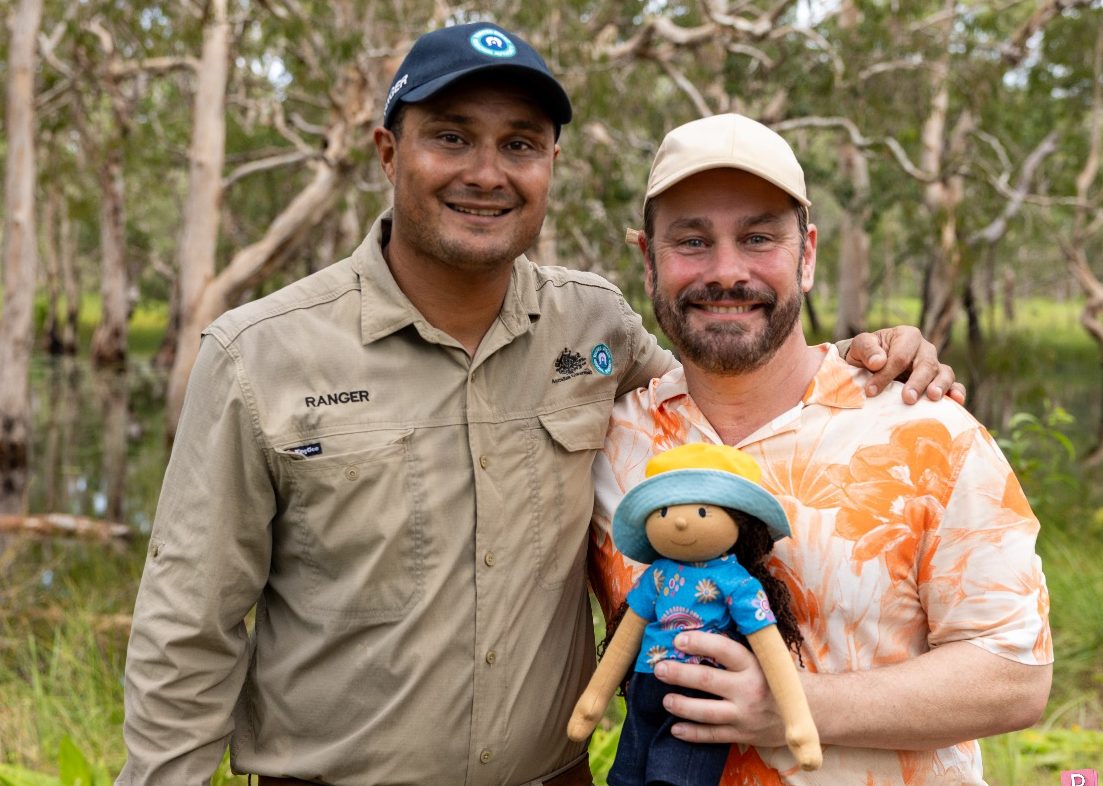
Torres Strait hosts ABC Play School
For the first time since its initial broadcast in 1966, ABC’s Play School has visited the nation’s northernmost region to share traditions and culture of Zenadth Kes (Torres Strait).
Play School presenter Teo Gebert, toys Jemima and Kiya, plus an ABC production crew made the maiden trip to the remote region, about 800km north of Cairns in Far North Queensland.
Play School series My Place, My Home, episode 3 Island Life, which premiered on Wednesday 11 June, was filmed on Badu Island in partnership with the Torres Strait Regional Authority (TSRA) Mura Badhulgau Rangers.
Ranger Supervisor Laurie Nona said the episode highlighted the island’s unique, cultural practices, landscapes and animals, including the Kawral Waleck – the frilled-neck lizard – and its importance and place in Torres Strait Islander myths and legends as part of the ancient practice of storytelling.
“To welcome Play School to the Torres Strait for the first time on our island home of Badu was a special experience,” Ranger Laurie said.
“The filming showcased our island, culture and traditions through the eyes of our children, community and rangers.
“It shared a look into the life of TSRA Rangers and our important work caring for flora and fauna, the animals of the land and sea.
“Play School’s visit to the Torres Strait, what you see both on the screen and behind the scenes, has the power to inspire the next generation of rangers, producers and film makers in our communities,” he said.
The Torres Strait region is rich in culture and the home of two traditional languages, Meriam Mer and Kala Lagaw Ya, along with six dialects.
Locals effortlessly weave English and Torres Strait creole with traditional languages of their islands.
TSRA Chairperson George Nona is a proud Badulaig, Goemulaig, Saibailag, Mua and Erub man from Badu and lives on Waiben (Thursday Island).
The 49-year-old traditional language speaker said the iconic children’s show provided more than entertainment for his generation.
“Play School holds a special place in the hearts of Torres Strait Islanders, especially those of us from the islands who learnt to speak English by watching Play School,” Mr Nona said.
“In a full-circle moment, we are in return sharing words and language from the Torres Strait with Play School audiences across Australia.
“We also learnt the name of Play School doll, Kiya, which means ‘hello’ in Noongar language, sounds similar to word Kaiar, meaning ‘crayfish’ in the Torres Strait,” he said.
The father of seven said the episode represented a wholesome act of reconciliation.
“For Torres Strait Islander culture to be celebrated on Play School, cherished and embraced by households across Australia, is a proud moment for our people and region,” he said.
“Our children and families, including older generations who grew up watching and learning from Play School, can now see themselves reflected in the show.
“Recognition of Torres Strait Islander culture at a national, mainstream level is a historic achievement not just for one community, but for the whole region and all Torres Strait Islanders from the islands to the mainland.
“Play School’s acknowledgement of the culture, strength and beauty of the Torres Strait represents reconciliation on many levels.”
The filming was delivered in partnership with TSRA’s Culture, Art and Heritage and Environmental Management programs, including world-class rangers.
Play School series My Place, My Home, episode 3 Island Life is available to stream free, on-demand on ABC iview:
https://iview.abc.net.au/show/play-school-my-place-my-home









